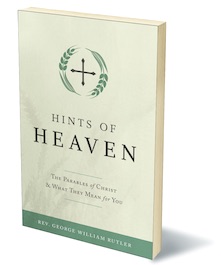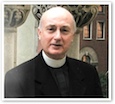Wisdom and the Parables of Jesus
- FATHER GEORGE W. RUTLER
When William F. Buckley, Jr., was asked why he slouched so much, he said it was because he was bent under the weight of all the wisdom he carried.
 One gets the impression that the author of Ecclesiastes, one of the twenty-four "Writings" of the Old Testament, must have been very bent over under such wisdom, but he does not seem to have been the sort to make amusing, self-deprecating comments. He is deeply serious, and his counsels are thoroughly sobering, even when he advises us to "eat, drink and be merry" (Ecclesiastes 8:15), because that seems the only way to make the best of a bad day. Ecclesiastes is the Latin version of the Greek translation of the Hebrew Koheleth, which means "Gatherer," for the author gathers wisdom from his own experience. Yet this wise man does not seem to have taken pleasure in writing so many wise things, for he sighs: "Of making many books there is no end, and much study wearies the body" (Ecclesiastes 12:12).
One gets the impression that the author of Ecclesiastes, one of the twenty-four "Writings" of the Old Testament, must have been very bent over under such wisdom, but he does not seem to have been the sort to make amusing, self-deprecating comments. He is deeply serious, and his counsels are thoroughly sobering, even when he advises us to "eat, drink and be merry" (Ecclesiastes 8:15), because that seems the only way to make the best of a bad day. Ecclesiastes is the Latin version of the Greek translation of the Hebrew Koheleth, which means "Gatherer," for the author gathers wisdom from his own experience. Yet this wise man does not seem to have taken pleasure in writing so many wise things, for he sighs: "Of making many books there is no end, and much study wearies the body" (Ecclesiastes 12:12).
I can sympathize with that, but there are some books that are relatively painless for an author, if not for all his readers. This month I have a new book that was not wearisome to write, first because it is not long, and second because it is a meditation on the parables of our Lord. While my words may be faulty, his words "shall never pass away," and I felt safe in hiding behind them. It was the publisher's suggestion to name it Hints of Heaven because the parables are precisely that: ways the Master gives his followers clues, by various images, to the mysteries of heaven. Even an inspired writer like Ecclesiastes did not come from heaven, so while his wisdom is divinely inspired, it is not divine. Thus, for instance, in one of his parables, the Lord quotes Ecclesiastes about "eating and drinking and being merry" (Luke 12:16-21), but with a whole other meaning.
The first parables are from the period between the second and third Passovers of his ministry, following the Sermon on the Mount, and are about spreading the Good News of eternal life. In the third year of his ministry, he tells parables about God's mercy. Approaching the Passion, his parables are about the Second Coming, the Day of Judgment, the penalties for arrogance and the rewards for humility.
The late Orthodox theologian, Alexander Schmemann, who instructed me briefly, said, "Books and words, created quite recently, yesterday and the day before, have become outdated, have fallen into nonexistence. They no longer say anything to us; they are dead. But these ingenuous stories, so simple in appearance, live on, full of life. We listen to them, and it is as if something happens with us, as if someone has glanced into the very depth of our life and said something which relates only to us, to me."
 This is Meaghen Gonzalez, Editor of CERC. I hope you appreciated this piece. We curate these articles especially for believers like you.
This is Meaghen Gonzalez, Editor of CERC. I hope you appreciated this piece. We curate these articles especially for believers like you.
Please show your appreciation by making a $3 donation. CERC is entirely reader supported.

Acknowledgement
 Father George W. Rutler. "Wisdom and the Parables of Jesus." From the Pastor (February 1, 2015).
Father George W. Rutler. "Wisdom and the Parables of Jesus." From the Pastor (February 1, 2015).
Reprinted with permission of Father George W. Rutler.
The Author
 Father George W. Rutler is the pastor of St. Michael's church in New York City. He has written many books, including: The Wit and Wisdom of Father George Rutler, The Stories of Hymns, Hints of Heaven: The Parables of Christ and What They Mean for You, Principalities and Powers: Spiritual Combat 1942-1943, Cloud of Witnesses — Dead People I Knew When They Were Alive, Coincidentally: Unserious Reflections on Trivial Connections, A Crisis of Saints: Essays on People and Principles, Brightest and Best, and Adam Danced: The Cross and the Seven Deadly Sins.
Father George W. Rutler is the pastor of St. Michael's church in New York City. He has written many books, including: The Wit and Wisdom of Father George Rutler, The Stories of Hymns, Hints of Heaven: The Parables of Christ and What They Mean for You, Principalities and Powers: Spiritual Combat 1942-1943, Cloud of Witnesses — Dead People I Knew When They Were Alive, Coincidentally: Unserious Reflections on Trivial Connections, A Crisis of Saints: Essays on People and Principles, Brightest and Best, and Adam Danced: The Cross and the Seven Deadly Sins.




